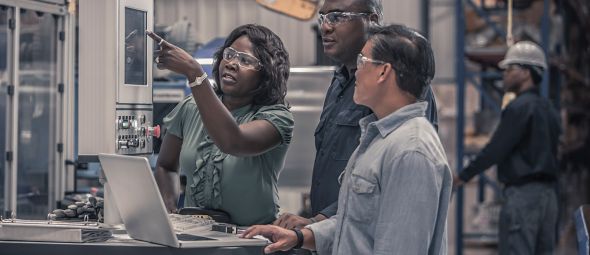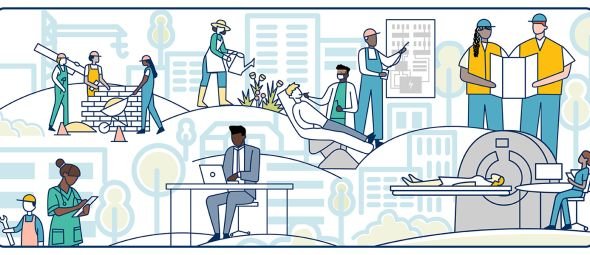Overview
People’s access to opportunity and advancement in the labor market is shaped by macroeconomic forces, technological change, policy choices, and labor market dynamics. Over the past 40 years, these influences have culminated in greater income inequality and less upward economic mobility for US workers. They have also contributed to a growing share of low-wage jobs in the US labor market. WorkRise generates evidence on and elevates our understanding of how macroeconomic, technological change, policy, and labor market dynamics influence economic security and mobility.
Working Knowledge

Job search and matching
April 08, 2022
Changemaker Q&A
How “Netflix for Jobs” Is Unlocking Economic Mobility: A Q&A with Scott Jensen
Chief executive officer and vice president of external affairs for Research Improving People's Lives shares insights on how data, science, and technology can identify promising employment and training opportunities for jobseekers looking to earn more or gain new skills.

Economic context
March 22, 2022
Article
New and Noteworthy: Research on gender wage gaps, remedies for occupational segregation, and more
March is Women’s History Month, and labor experts and advocates are rightfully focused on persistent wage disparities between women and men despite laws against gender discrimination. Our column this month highlights new research focused on gender pay gaps.

Job search and matching
February 22, 2022
Changemaker Q&A
Activating Pathways for Mobility: A Q&A with Opportunity@Work
WorkRise grantee Opportunity@Work is building a movement to dismantle structural inequities in the labor market to expand opportunity to workers without college degrees.

Economic context
February 22, 2022
Article
New and Noteworthy: Research on discrimination in lending, a new equity-focused institute for direct care workers, and more
Structural racism has shaped the labor market and employment experiences of Black workers, but evidence that leads to action can help dismantle harmful policies and practices and rebuild equitable ones in their place.
Research
Economic context
Brief
Last updated on January 14, 2025
Workforce Strategies for New Industrial Policies: Governors’ Emerging Solutions
The report summarizes findings from interviews with 16 governors’ workforce development policy advisers in states that vary in terms of their political leadership, geographies, and populations.
Grantee Research

Economic context
Last updated on July 09, 2024
Expanding Worker Opportunities Through Evidence: WorkRise Impact Report 2023
By bridging knowledge gaps and forging multi-stakeholder partnerships among employers, worker advocates, policymakers, and practitioners, WorkRise is meaningfully improving economic mobility for lower-wage workers. Our 2023 Impact Report shares more about how we lead with rigorous yet actionable research and get it into the hands of the change makers best positioned to act on it.
Last updated on July 09, 2024
Economic context
Report
Last updated on May 14, 2024
Aligning Workforce and Economic Development to Benefit Workers
In this report, WorkRise examines what we know about the impacts of the workforce development and economic development fields and their implications for equitable economic outcomes for low-wage workers, especially Black individuals and other people of color who have faced systematic challenges in economic mobility.
WorkRise Research
Economic context
Report
November 20, 2023
Quantifying the Costs of Rising Unemployment
Rising unemployment brings significant costs to workers, their families, social outcomes, and the economy at-large. The contemporary tight labor market provides a good opportunity for researchers to better understand the benefits of low unemployment and thus the risks of high unemployment.
WorkRise Research

Economic context
Infographic
September 12, 2023
Leveraging Federal Funds to Create Quality Jobs
Do you want better jobs for your community? Through new federal dollars, state and local policymakers have a once-in-a-generation chance to build a new and thriving workforce.
WorkRise Research